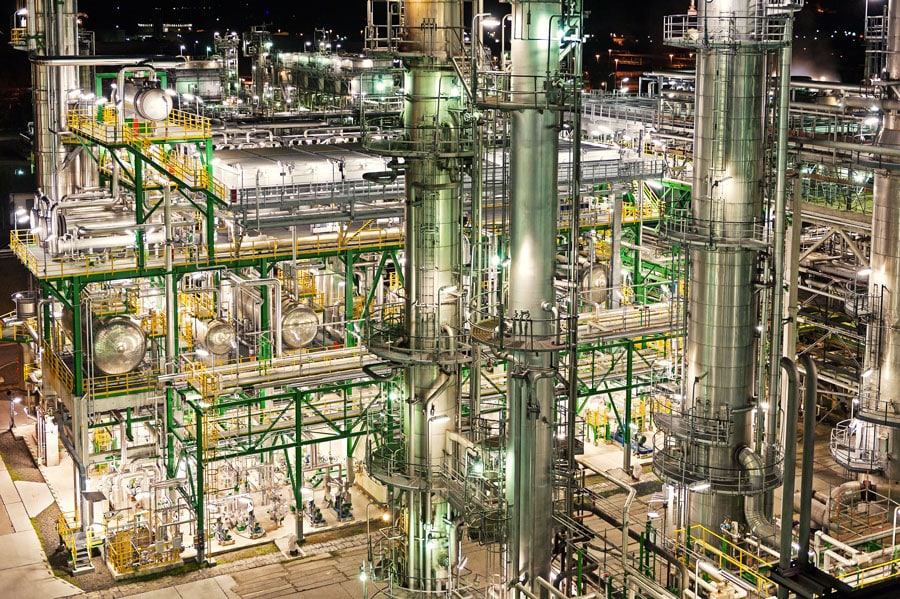For months now, local media outlets have been trying to outdo each other with ever-bolder claims about hydrogen’s potential role in saving the PCK refinery in Schwedt, Germany. Regional public broadcaster rbb24 has gone so far as to show an evening TV documentary on the subject. The program repeatedly emphasized that the production and processing of large quantities of green hydrogen is due to go ahead at the refinery as part of cooperation with the company Enertrag. However, when questioned by H2-international, Enertrag press spokesman Michael Rassinger made it clear in early March 2023 that there is no joint project at present and that both parties are still in talks. On April 5, the news followed that Siemens Energy has reportedly been tasked with devising an engineering design concept for the production of green hydrogen at the PCK refinery.
Prior to this revelation there had been grand plans but little substance. Last fall, Enertrag’s founder Jörg Müller banded together with local politicians to campaign for electrolyzer plants of up to 300 megawatts. His visions were gratefully seized upon by both the media and politics.
In actual fact, Müller had withdrawn from the day-to-day running of Enertrag on July 1 last year, handing the baton to Gunar Hering. Nevertheless it would seem that Müller, who has since become chairman of the supervisory board, is still viewed, at least by the media, as an “energy transition visionary” with the capacity to speak on behalf of the company. Referring to hydrogen production at the PCK refinery, in October 2022 he talked of “compelling circumstances” requiring “extremely rapid action.” Yet around half a year later, the visions he had for his company had gone up in smoke.

Now Siemens Energy has arrived on the scene with its sights set on several electrolyzers with a total capacity of about 100 megawatts. Its purported goal is to initially replace the gray hydrogen that had been previously manufactured from natural gas with green hydrogen. Ralf Schairer, management spokesman for PCK Raffinerie GmbH, explained: “We are convinced that refineries with the present infrastructure will still be required in the future. We know that our products will change over the coming years in order to meet ambitious climate protection targets. […] This basic engineering in collaboration with Siemens Energy is an important step toward the future.”
It is also understood that green hydrogen will play a decisive part and will be involved in all subsequent processes. With support from the German government and the state of Brandenburg, the necessary structures could be created that would allow a significant contribution to be made toward achieving tough national climate goals. Brandenburg’s economy minister Jörg Steinbach said: “The agreement between Siemens Energy and PCK is an important step in reshaping the direction of the refinery. Hydrogen has a major role to play when it comes to replacing fossil fuels with renewable sources. […] For PCK, the electrolyzer represents an important building block in the refinery’s necessary transformation to alternative energies.”
Problems at the PCK refinery
The refinery has been going through a difficult time. Since its construction in 1964 it has been reliant on Russia. Up until the end of 2022 it was still exclusively refining Russian crude oil. The company’s ownership structure remains particularly precarious, with the Russian state-owned Rosneft originally holding over half the shares in the business. In September 2022, however, the German economy ministry appointed Germany’s Federal Network Agency as the custodian of Rosneft Deutschland GmbH and RN Refining & Marketing GmbH. Today, Rosneft Deutschland and Shell Deutschland each own a 37.5 percent stake in PCK. A total of 25 percent belongs to AET Raffineriebeteiligungs-Gesellschaft.
The company as well as the town of Schwedt and the wider region are finding it hard, both economically and mentally, to shake off the past. Thus PCK itself has had some part to play in creating the appearance that locally based Enertrag and the Schwedt refinery are working together on hydrogen. In late fall 2022, PCK disclosed that an electrolyzer plant with an overall capacity of 32 megawatts was being planned in partnership with Enertrag. Yet the announced plans did not gain any further traction and were never restated.
Schwedt’s mayor, Annekathrin Hoppe, who is at great pains to preserve jobs at the town’s primary taxpayer, is equally hopeful that something will come of the bandied hydrogen aspirations. Schwedt is working on founding a structural development company that would certainly benefit from greater funds and additional opportunities if its portfolio contained a hydrogen facility.
Grand visions
Enertrag, headquartered in Uckermark, is without doubt one of the leading players in wind power generation and is a pioneer in green hydrogen technology. At the end of February 2023, the company announced its intention to produce green hydrogen from 2024 in order to meet the energy needs of the Osterweddingen industrial park. This is set to entail the use of a 10-megawatt electrolyzer in Magdeburg which would be based on proton exchange membrane or PEM technology. The plant was ordered back in December of last year from Elogen, an enterprise belonging to the GTT Group.
In the first stage of production, the plant is expected to make 2 metric tons of hydrogen a day. This type of electrolyzer could potentially increase its output to up to 5 metric tons a day. Enertrag has even more ambitious plans for Namibia where the company is to build a hydrogen production facility costing almost USD 10 billion that will turn out 300,000 metric tons of green hydrogen annually (see H2-international, October 2021).
These projects provide a clear indication of the scale and potential of hydrogen production that is currently under discussion at Enertrag.
In mid-March 2023, Enertrag gave H2-international the following comment: “We are currently working on a feasibility study that we expect to publish at the end of April.”
Authors: Aleksandra Fedorska, Sven Geitmann
Source: PCK


